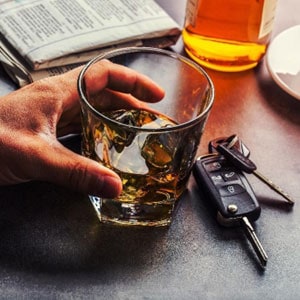
Despite being one of the most common charges levied against Californians every day, too few drivers understand DUI laws or charges. This article aims to remedy that and help you understand how to behave and what to do to minimize your penalties or avoid a DUI charge altogether, including:
- What you should say (or not say) and what questions you have to answer when pulled over in California.
- Your rights and penalties concerning roadside standardized field sobriety tests and chemical tests.
- The penalties you risk for a DUI in California and how best to avoid them.
How Is Driving Under The Influence Defined In California Law?
Under California law, there are several elements to Driving Under the Influence (DUI). The term can be broken down into two components that the prosecution will have to prove: that you were driving and that you were under the influence. They must show both.
If you were not driving, for example, if you were sitting on the hood of your car, you could not be charged with a DUI. Equally obviously, you cannot be driving now, have a drink later, and then get a DUI. It must be both at the same time.
So, let us break both down because understanding how the crime is defined is the first step to knowing how to beat the charge.
How Is Driving Defined And Proven In California?
While it might seem obvious, defining and proving driving in California law is actually kind of tricky. There has to be volitional movement, meaning the car or other vehicle has to move while you are in control of it.
For example, if you were passed out behind the wheel and the car rolled, that is not grounds for a DUI charge. On the other hand, if you back the car up just one foot and you were intoxicated, that could be grounds for a DUI.
However, driving can also be proven circumstantially. If your car has broken down on the road and you are drunk and walking around trying to find a gas station, the police may decide to charge you with driving under the influence. Unless you can demonstrate that you became intoxicated after the car broke down or that someone else was driving it at the time, you might get charged even if you were not seen driving drunk.
How Is Under The Influence Defined In California Law?
Next, law enforcement then needs to demonstrate you were under the influence. With alcohol, that is usually clear. There is a blood alcohol limit of .08%, over which you are legally defined as intoxicated and under the influence.
But it becomes more complicated with cannabis. There is no such limit; instead, it is important for law enforcement to show that it affected your driving somehow. This is because most drugs will stay in your system for a long period of time, so having a drug in your system does not necessarily mean you were under the influence at the time of driving.
This is also why law enforcement will try to get an admission or answer out of you when they pull you over, if they can get you to admit you were under the influence, they will use that against you.
What Questions Am I Required To Answer When Stopped By Law Enforcement In California?
Typically, the police will start by asking you for identification and license; you must comply with this request. It is wise to be polite but not chatty during this exchange; you do not want to volunteer information.
Legally, those are the only questions you are required to answer. You do not have to answer any pre-investigation or investigative questions. You do not need to say where you are coming from or answer any other questions. You can simply decline to answer and invoke your Fifth Amendment right if you wish.
On the other hand, if you fail to provide your identification, the cop is allowed to take you out and arrest you to try and find out who you are. If they insist you answer any other questions, simply ask if you are allowed to leave or to call an attorney until they leave or arrest you, no matter what they say.
Even if they ask for you to complete a field sobriety test.
During A DUI Stop, Am I Required To Do A Roadside Standardized Field Sobriety Test?
Field sobriety tests are voluntary, though the police probably will not tell you that. They may even try to make it seem like you have to do one or that it is in your best interest to do so. But you are not, and it is almost never in your interest to do so.
If you refuse, technically, they cannot do anything. Testing refusal laws and penalties only apply to chemical testing, such as blood or breath tests, not field sobriety tests. The cops might make it seem like you are going to be in big trouble because you refuse to do the field sobriety test.
They can try, if the case eventually goes to trial, to argue that your refusal to complete the field sobriety test indicates a consciousness of guilt, but that is not mandatory. It is not automatic evidence of guilt.
Failing the field sobriety test, however, (which is entirely possible to do while sober) can and certainly will be used against you.
The police legally cannot make you do the field sobriety tests, nor can they make you do the handheld breath test that sometimes comes along with the field sobriety.
Do I Have To Give A Breath Or Blood Sample During A DUI Arrest In Los Angeles County?
If you are driving in California, you have, technically, already agreed to give a breath or blood sample. This is due to implied consent laws. If you fail to do so, there are additional penalties that can be imposed, which could include jail and a longer driver’s license suspension.
Therefore, while you do not have to, you should do so unless you are willing to face those consequences.
In general, the additional consequences are quite severe, so it is rarely a good idea to refuse. The case could still go your way after all. A strong lawyer might be able to prove that the police did not have the right to even ask you to take the blood or breath test and get its results thrown out.
But if you refuse to take it, the consequences are generally going to be worse even than if you take it and fail.
What Should I Do After Being Released From Police Custody Following A DUI Arrest?
What you do immediately after your arrest can have a big impact on the outcome of your case. As a result, the following two steps can help improve your situation:
- Write down everything. As soon as possible, record everything that happened that entire day from the time you woke up to your release. Memories fade, and you want to get all those little details locked in.
- Call an attorney as soon as possible. You need to start gathering information and exploring your options. Only an experienced attorney can help you do so.
After all, the penalties for a conviction can be quite severe and impact your life well beyond a simple fine or jail time.
What Are The Penalties For A DUI Conviction In California?
There are a wide range of penalties for a DUI conviction, depending on the circumstances, evidence, whether it is your first conviction, and so forth. You could face anywhere from no time in custody to up to a year on a misdemeanor charge and up to three years in prison on a felony DUI.
What Will Happen To My Driver’s License After A DUI In California?
Your driver’s license, on the other hand, will almost certainly be suspended regardless of the circumstances.
Your charge and conviction may influence how long you lose it, however. In general, your license will be suspended for anywhere from four months up to three years.
Keep in mind that you may need your license to get to work or that your job may even be driving. Such a penalty can sometimes be worse than any fine or jail time.
Do I Need A DUI Attorney If I Plan To Plead Guilty?
You might think the evidence is against you, and the prosecution will certainly tell you that is the case, and you might be wondering whether to plead guilty. Technically, you do not need an attorney to do so.
The reality is often, however, that you would have been better off consulting with one first. There are many tricky aspects to DUI cases, from the chemical testing procedures to the rules that allow the police to pull you over, which you are unlikely to be aware of.
Thus, even if you fully understand the consequences of pleading guilty (and that is doubtful), you might not have to at all with the help of an experienced DUI defense attorney. For more information on DUI Cases Handled In California, an initial consultation is your next best step.

Attorney Matthew Cargal is a highly experienced criminal defense attorney helping anyone accused of DUI, battery, domestic violence, and other crimes throughout LA County and Southern California. A recognized expert on DUI defense law, with hundreds of cases and trials under his belt, Matthew Cargal hopes to help everyday Americans understand and defend their rights by sharing insights from his considerable experience. Connect with The Law Offices Of Matthew Cargal to stay up to date on the latest developments in criminal defense law so that you, too, can benefit from his insights into California criminal law. Call Now At
(626) 356-1392.